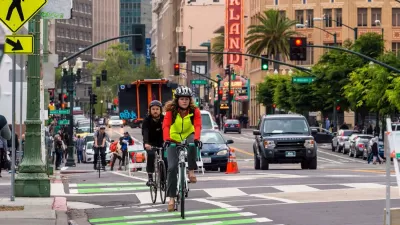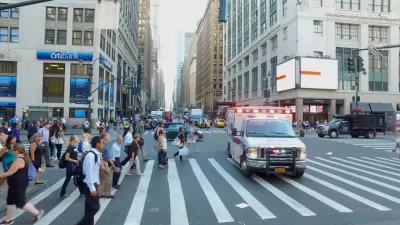Taking Vision Zero beyond the local level.

"[F]ederal safety agencies are stepping in with an ambitious strategy to completely eliminate road fatalities nationwide by 2050," according to an article by Alissa Walker.
Walker is sharing insight into the Road to Zero report—released recently by the National Safety Council, working closely with the U.S. Department of Transportation and "over 600 industry groups"—as the first national strategy to eliminate traffic fatalities.
"Key recommendations from the report confirm that the Vision Zero strategy is working—focusing on physical changes to the urban streetscape that are known to save lives," writes Walker. "The report cites specific improvements as particularly effective, like narrowing crossing distances using curb extensions or reprogramming walk signals to give pedestrians a head start at intersections (known as a Leading Pedestrian Interval, or LPI)."
"The report also champions what’s called a “safe systems” approach for transportation planning—integrating life-saving improvements consistently and universally into every roadway, where unforgiving design currently makes errors deadly," adds Walker.
The article includes a lot more insight into the actions proposed by the report, as well as the traffic engineering and transportation planning context that shapes the need for the report.
FULL STORY: U.S. sets a nationwide goal to end traffic deaths by 2050

Planetizen Federal Action Tracker
A weekly monitor of how Trump’s orders and actions are impacting planners and planning in America.

Congressman Proposes Bill to Rename DC Metro “Trump Train”
The Make Autorail Great Again Act would withhold federal funding to the system until the Washington Metropolitan Area Transit Authority (WMATA), rebrands as the Washington Metropolitan Authority for Greater Access (WMAGA).

DARTSpace Platform Streamlines Dallas TOD Application Process
The Dallas transit agency hopes a shorter permitting timeline will boost transit-oriented development around rail stations.

Renters Now Outnumber Homeowners in Over 200 US Suburbs
High housing costs in city centers and the new-found flexibility offered by remote work are pushing more renters to suburban areas.

The Tiny, Adorable $7,000 Car Turning Japan Onto EVs
The single seat Mibot charges from a regular plug as quickly as an iPad, and is about half the price of an average EV.

Supreme Court Ruling in Pipeline Case Guts Federal Environmental Law
The decision limits the scope of a federal law that mandates extensive environmental impact reviews of energy, infrastructure, and transportation projects.
Urban Design for Planners 1: Software Tools
This six-course series explores essential urban design concepts using open source software and equips planners with the tools they need to participate fully in the urban design process.
Planning for Universal Design
Learn the tools for implementing Universal Design in planning regulations.
Municipality of Princeton
Roanoke Valley-Alleghany Regional Commission
City of Mt Shasta
City of Camden Redevelopment Agency
City of Astoria
Transportation Research & Education Center (TREC) at Portland State University
US High Speed Rail Association
City of Camden Redevelopment Agency
Municipality of Princeton (NJ)





























